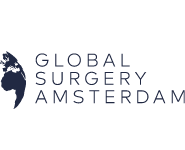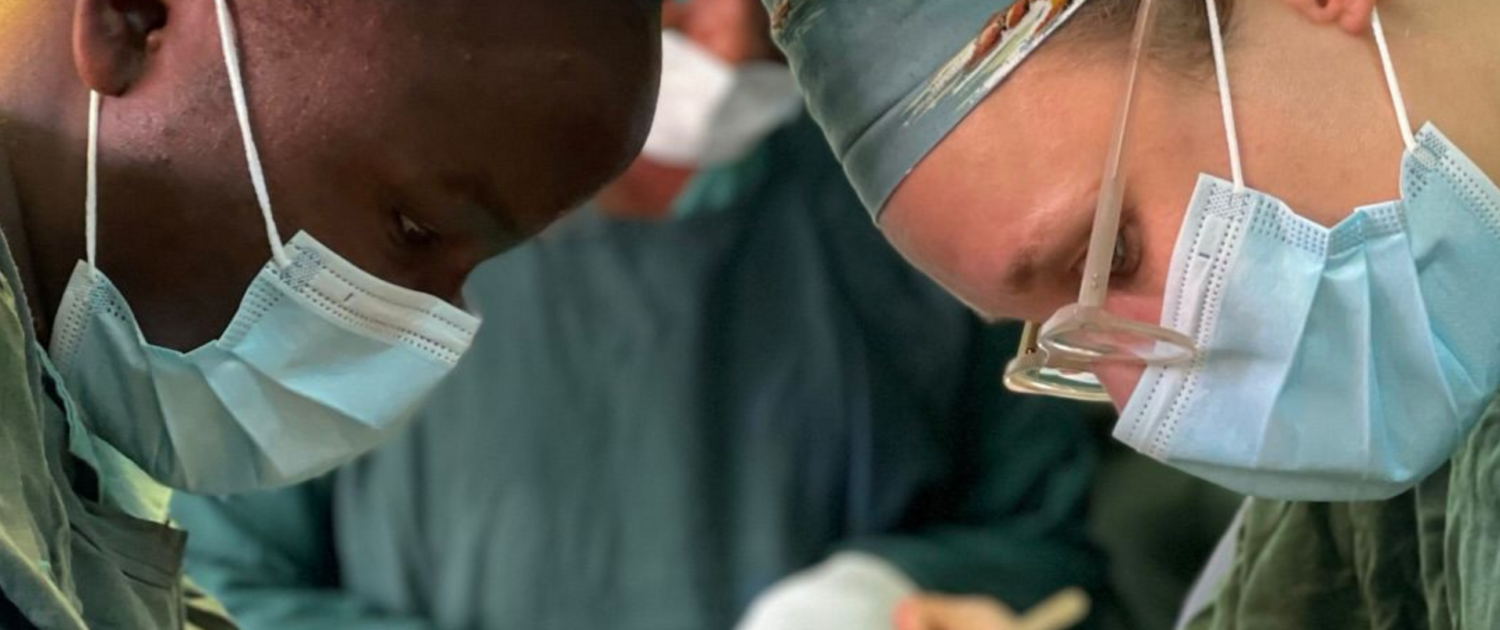From Parachute Missions to Sustainable Capacity Building: How Surgical Care in Rural Tanzania Is Evolving
From Parachute Missions to Sustainable Capacity Building: How Surgical Care in Rural Tanzania Is Evolving
For years, global health relied on “parachute missions”—where foreign experts would fly in, provide surgical care, and leave. But once they were gone, so was their expertise. While these parachute missions offered temporary relief, they did not build long-term capacity among local healthcare workers. Many patients suffering from for example burn injuries and open fractures did not receive adequate treatment due to a lack of trained medical personnel. It became clear that the severe shortage of trained healthcare professionals in surgical trauma care, leading to preventable mortality and lifelong disabilities, needed a different approach.
This is why Global Surgery Amsterdam (GSA), in partnership with Haydom Lutheran Hospital (HLH) and Doctors of the World (DvdW), decided to build a program aimed at sustainable local capacity building. Our Surgical Training Program started with a focus on the two most prominent surgical trauma’s in low-resource settings, burn care and open fracture management. Currently, we are introducing anesthesia care and a comprehensive Train-the-Trainer model to the program.
The Starting Point: 2021–2023
- Structured Surgical Training Camps
Each camp blended direct patient care (treating ~150 patients in total) with courses on burn care or open fracture management. The result is that over 120 healthcare providers – medical doctors, surgeons, nurses – gained essential experience and skills. - Digital education and training platform To make surgical education more accessible and impactful, we have created digital learning platforms that complement hands-on training:
- Basics of Burn Care: A structured, easy-to-follow online resource providing essential guidelines for burn assessment, treatment, and rehabilitation, specifically designed for healthcare providers and applicable in settings all over the world.
- Basics of Open Fractures (in development): A comprehensive platform focused on trauma care and open fracture management, equipping clinicians with the knowledge and skills to provide effective, evidence-based treatment.
These digital platforms ensure that training continues beyond in-person workshops, allowing healthcare providers to reinforce and expand their skills at their own pace.
- On-the-Job Learning
Beyond classroom lectures and hands-on workshops, real surgical mentorship is at the core of our training approach. Teams from GSA work side by side with HLH staff in the operating theater and on the ward, ensuring that every procedure is a practical learning experience.- In the theater, local clinicians receive direct guidance while performing critical procedures such as scar contracture releases for burn victims and external fixation for open fractures.
- On the ward, trainers provide bedside instruction on wound care, post-operative management, and early rehabilitation strategies, reinforcing best practices in real time.
This immersive, case-based training ensures that participants not only learn the techniques but also gain confidence in making independent clinical decisions, improving patient outcomes well beyond the training sessions.
- Initial Impact
By the end of 2023, HLH’s clinicians demonstrated significant improvements in their surgical techniques and gained greater confidence in managing complex burn and trauma cases independently. Patients who might have previously been referred elsewhere were now receiving high-quality care on-site.
However, the challenge remained: How do we sustain and scale these successes across the region to ensure more healthcare providers—and ultimately more patients—benefit from these advancements?
Expanding the Vision: 2024–2028
The next phase—”From Partnership to Ownership”—marks a crucial shift toward local leadership and sustainability. Over the next five years, we aim to embed long-term surgical capacity by:
- Strengthening local expertise in burn care, open fractures, and anesthesia.
- Expanding on-the-job mentorship in both theater and ward settings.
- Fully integrating the Train-the-Trainer model, ensuring that knowledge is not only gained but also passed on across multiple hospitals and clinics in Tanzania.
Why a Train-the-Trainer model?
- Multiplier effect: Instead of training a single group, Train-the-Trainer graduates become trainers themselves, exponentially increasing the reach and impact of the program.
- Local empowerment: Train-the-Trainer focuses on developing leadership and teaching skills among doctors, nurses, and anesthesia providers, allowing them to continue training future cohorts long after external teams have left.
- Regional network: As trained healthcare providers go to new facilities, they bring their expertise with them, expanding essential surgical and anesthesia care deeper into rural Tanzania and in time, across the East-African region.
By shifting from external-led training to locally driven education, we are laying the groundwork for a self-sustaining system, ensuring that life-saving surgical skills continue to grow and evolve within the region.
Why Focus on Anesthesia?
A key component of the 2024–2028 expansion is the integration of a dedicated anesthesia training program—a critical step in ensuring safer surgeries and better patient outcomes, particularly in rural settings.
- Bridging a critical gap: Many nurse anesthetists and anesthesia officers have not received refresher training since their initial education, leading to inconsistencies in perioperative care and increased risks during surgery.
- Enhancing patient safety: Our anesthesia course focuses on airway management, patient monitoring, drug safety, and emergency response, significantly reducing the risk of anesthesia-related complications.
- Strengthening the surgical ecosystem: Safe surgery cannot happen without safe anesthesia. By embedding an anesthesia module alongside burn care and open fracture training, we create a holistic approach to surgical education—ensuring that every aspect of perioperative care is optimized.
By addressing this long-standing gap, we are empowering local anesthesia providers with the skills they need to deliver safe and effective care, reinforcing the sustainability of surgical services across the region.
Early Results: A Short Summary of Recent Evaluations
- Better Techniques, more confidence: Participants report feeling more capable and self-reliant when handling complex burns and open fractures. Cases that were previously referred to larger hospitals are now being treated on-site, improving access to timely surgical care.
- High Satisfaction with hands on training: Post-course surveys indicate that nearly all participants find the training highly relevant to their daily work. The hands-on approach, real-world case discussions, and live surgical mentorship are consistently praised as the most impactful elements of the program.
- Ongoing Monitoring and Evaluation: To ensure continuous improvement, HLH’s coordination team tracks patient outcomes at 1, 3, 6, and 12 months post-treatment. This real-time feedback loop allows for:
- Fine-tuning of training materials based on observed clinical results.
- Measuring the impact of improved surgical techniques on infection rates, healing times, and complication reduction.
- Empowering local staff with data-driven insights to enhance patient care and sustain high standards of surgical practice.
- Building local leaders: Our pilot Train-the-Trainer course, conducted in November 2024 at Haydom Lutheran Hospital, provided a crucial milestone in local capacity-building. The focus was on equipping healthcare professionals with the skills to teach burn care while evaluating the effectiveness of the Train-the-Trainer model in a real-world setting.
- 10 trainees successfully completed the Train-the-Trainer course, and within the following week, they trained 21 participants in the Basics of Burn Care (BoBC) course.
- Evaluations from both the Train-the-Trainer trainees and their BoBC students confirmed the effectiveness of the teaching methods and structured mentorship approach.
- Train-the-Trainer trainees scored 4.5+/5 in key areas such as teaching effectiveness, engagement, and clarity—demonstrating their strong ability to transfer knowledge.
- All Train-the-Trainer trainees expressed a strong interest in further training, reinforcing the sustainability and scalability of the model as they prepare to train the next generation of healthcare providers.
These early results validate the long-term impact of a structured, hands-on training model. By transforming trainees into trainers, the program is ensuring that surgical and burn care expertise continues to expand across Tanzania—far beyond the walls of Haydom Lutheran Hospital.
Looking Ahead
By 2028, the program aims to embed burn care, open fracture management, and anesthesia training as permanent fixtures at Haydom Lutheran Hospital (HLH) and partner hospitals across Tanzania. This initiative is designed to build a regional network of trainers, ensuring that high-quality surgical education continues to expand independently of external teams.
- Self-sustaining growth: With Train-the-Trainer graduates replicating the curriculum, the program will significantly reduce reliance on visiting experts, allowing surgical and anesthesia expertise to spread organically to underserved regions.
- Regional expansion: Train-the-Trainer graduates will disseminate skills across multiple hospitals and clinics, increasing access to safe surgical care in rural areas where basic essential treatment was previously unavailable.
From “Parachute Missions” to a regional network of trainers
The transformation of Haydom Lutheran Hospital from a site reliant on short-term surgical missions into a self-sustaining, locally led surgical training hub demonstrates the power of long-term investment in local capacity-building.
- Burn Care, Open Fracture Management, and Anesthesia Training now form the core pillars of a movement to reshape surgical access in rural Tanzania.
- Local ownership is the ultimate goal. We are thrilled to see clinicians at HLH and partner hospitals stepping up as educators, not just trainees—leading the next generation of surgical and anesthesia providers.
By empowering local healthcare professionals to take charge of their own training and development, this initiative ensures that life-saving surgical care will remain accessible and sustainable for years to come.
Get Involved & Support the Future of Surgical Training
Global Surgery Amsterdam welcomes partnerships and support from healthcare professionals, donors, and organizations who share our vision of strengthening surgical capacity in low-resource settings. Your involvement can help us:
- Expand the Train-the-Trainer program, enabling more local clinicians to become educators.
- Develop and refine digital course materials, ensuring accessible, high-quality training for providers in remote areas.
- Enhance on-the-job mentorship in hospitals and surgical theaters, further embedding sustainable surgical expertise across Tanzania.
Every contribution—whether time, funding, or expertise—helps build a stronger network of local trainers and brings life-saving surgery within reach for thousands more patients across East Africa.
Join Us Today
Stay connected with our work by visiting our website and social media platforms for updates, success stories, and opportunities to contribute. For inquiries about volunteering, funding support, or institutional partnerships, reach out to us—we’d love to collaborate in shaping the future of surgical education.
Acknowledgments
A special thank you to Pharus Foundation for their generous support. Their commitment to global health and medical education has been instrumental in expanding surgical training and empowering local healthcare providers throughout Tanzania. Together, we are turning this vision into a reality.




